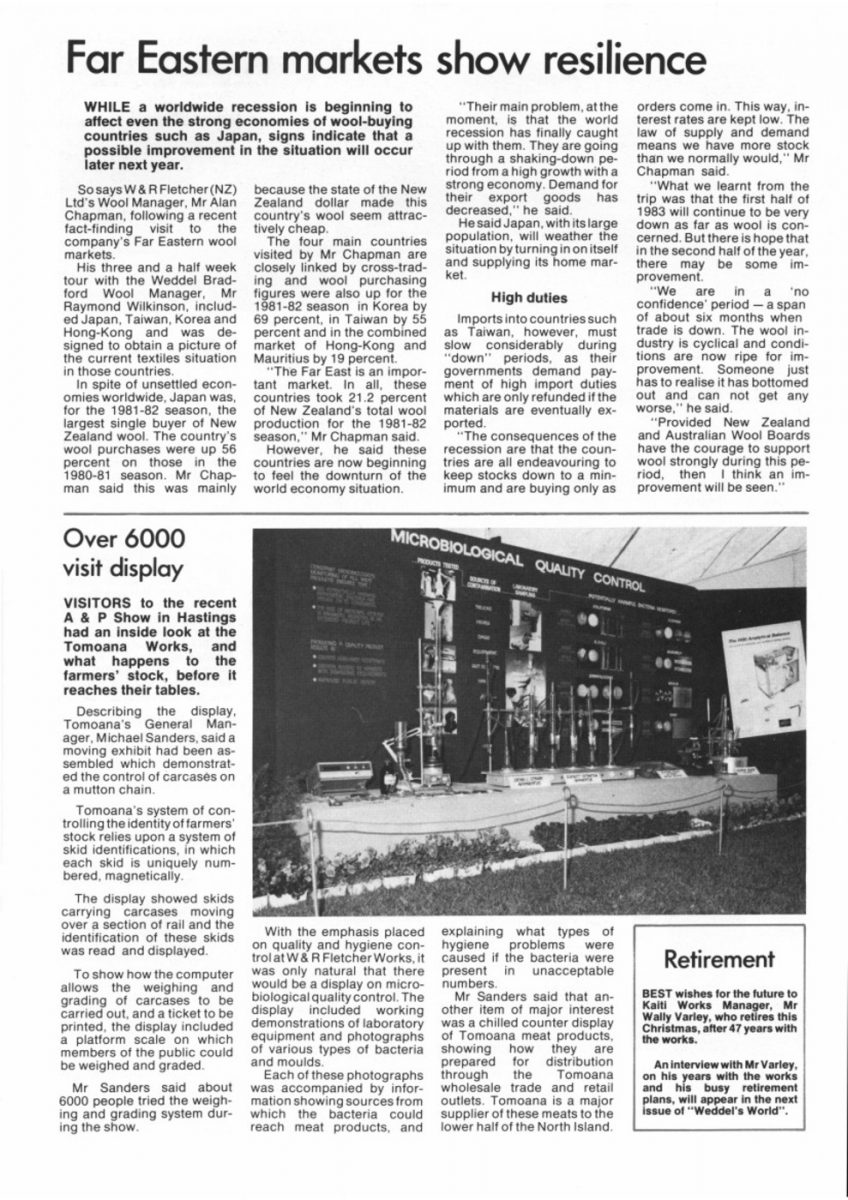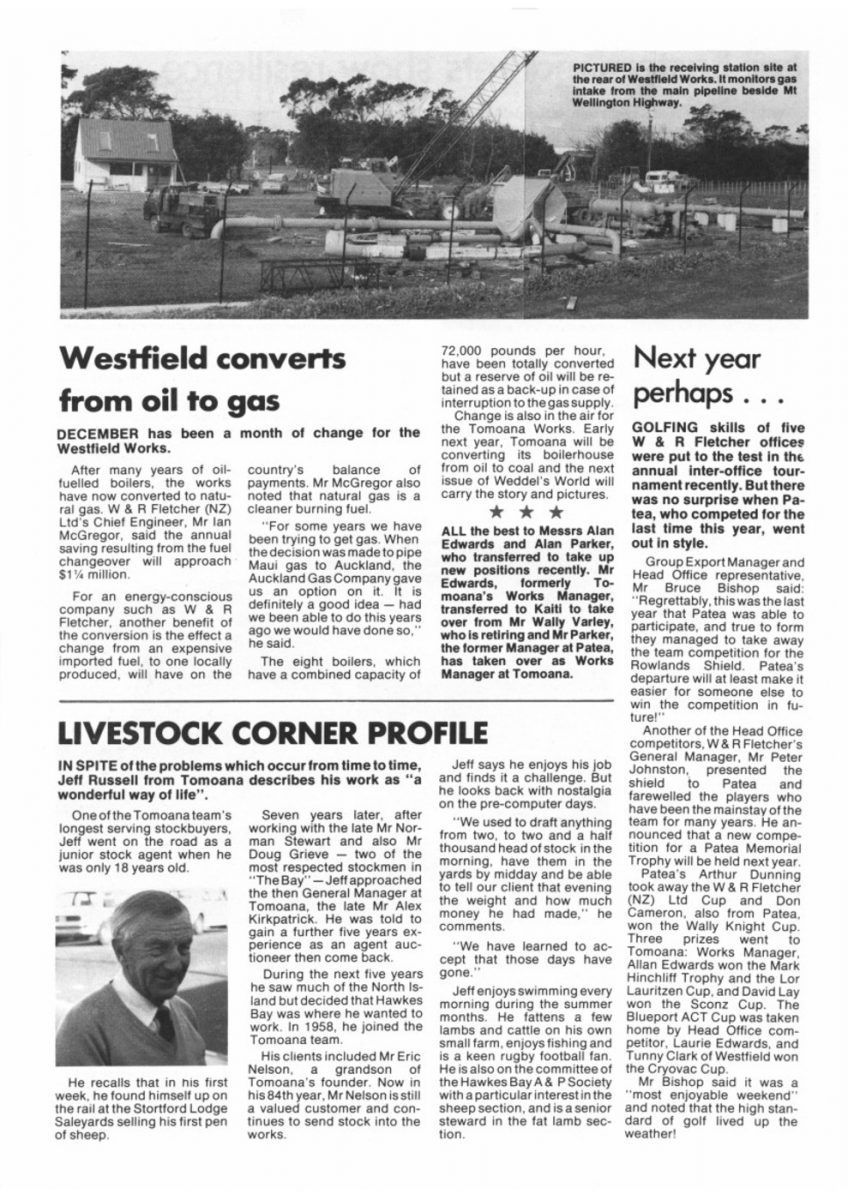Korean market has potential
A NEW Weddel office was officially opened in Seoul, Korea, last month.
W & R Fletcher (NZ) Ltd’s Export Manager, Mr Bruce Bishop, said Korea has been importing New Zealand meat from the company for “quite some years” and has such a potential for further development as a market, that an office with full branch status was opened.
Previously, selling was carried out through various agents, but now the branch will sell directly into the market. W & R Fletcher will be supplying any meat coming out of New Zealand. This will include the shipments of carcase lamb, processed into boneless lamb rolls, for the Japan market.
At present, the new branch has a staff of three. Mr John Wood, who has taken up the position of manager, spent several years in Japan’s Osaka office and has a background in Far East trading.
Also figuring in the export news from Korea lately, have been wet salted hides.
By-products Manager, Mr Harry Beauchamp, said 13 percent of W & R Fletcher’s available wet salted hides are exported to Korea. In all, 40 percent of the hides are going to the Eastern markets.
“I am pretty positive that the Eastern markets will continue to hold their own. We are pleased with the sales in the area,” he said.
“Italy and Europe are coming back into the area and showing strength. About 27 percent of wet salted hides and 36 percent of all hides, are going there.
Mr Beauchamp said that although major concern is still very much on the financial side, he can not see any major swing or change to upset the market. In fact, the Eastern market shows promise for further development.
“The market for wet blues has not as yet developed. This is mainly because of embargoes and strict controls to keep their own work force operative. Japan for instance imposes high duties and will not let wet blue hides in unless under special arrangement. We will continue to develop the market and as long as prices do not get out of hand, we hope sales of wet blues to these areas will increase,” Mr Beauchamp said.
He added that the number of kills is low at present, as the industry is in an off-season as far as beef is concerned. But he said the kill will probably get underway in February 1983.
Continued from front page
The magazine “Food Industry” has pointed out that the “commercial implications of a change in dietary habits are mixed and interesting” and said “there is already a worldwide trend towards lower meat consumption”.
It suggested that meat producers may have to consider marketing campaigns to offset the widening of the fibre trend. Mr Tony Ashton of the Meat Industry Research Institute of New Zealand in Hamilton, agreed.
Health food
“As a matter of personal opinion, I would say the meat industry should take the battle to the people. If other products can be successfully promoted, why not meat? It remains, so far as we know, and in spite of its image, a natural health food.
“The health aspect applies particularly to New Zealand’s sheepmeats. We have a healthy, natural, pasture-fed product, free of hormone supplements, artificial environments and laboratory formula feed recipes. I would say it is time we got meat into the health business, where it deserves a ‘prime’ place,” Mr Ashton said.
The Institute has recently made a preliminary review of scientific literature on meat’s nutritional qualities, and Mr Ashton said that on this evidence he would feel confident in asserting that a strong case may be made for the continuance of meat eating.
“People would be making a mistake if they gave up meat without being fully aware of the contribution it makes to their nutritional needs,” he said.
“We would argue that meat is important, at our present average consumption of about 100 grams of cooked meat a day, because:
it supplies more than half our protein intake;
it is a balanced supplier of all the essential amino acids:
it supplies many essential minerals and assists absorption of minerals from other foods:
it is a major B-group vitamin supplier and assists absorption of fat- soluble, A, D, E and K vitamins;
it provides essential fatty acids and fats, saturated and unsaturated, needed for energy and cell construction;
its fat plays an important role in satiety, the feeling of “fullness” which is a natural protection against overeating”.
In reference to fibre as a health-fad food, he said it has been found that it results in severe deficiences [deficiencies] in iron, zinc and vitamin B. There is also a danger that carboyhydrate [carbohydrate]-rich foods, taken in quantities necessary to avoid protein deficiency, would add to obesity problems.
“High-fibre dieting does not preclude meat and other animal products although sample weight-reducing diets recently published, would dramatically reduce the amount of these products consumed by the average New Zealander. This would leave many people at risk from anaemia unless iron supplements were taken. (High-fibre material blocks absorption of iron, and haem iron in meat is more readily bio-available than iron from other sources),” he said.
And while a “moderation in all things” will ensure a balanced and healthy diet at Christmas, rice, beans and bread are no substitute for the flavour of roasted New Zealand lamb.
Picture supplied courtesy of the New Zealand Meat Producers Board. A
Weddel “branches” out into Taiwan
FROM January 1, 1983, Weddel will operate its own office in Taipei, the capital of Taiwan.
This was announced by W&R Fletcher (NZ) Ltd’s Wool Manager, Mr Alan Chapman, following his recent tour of Far Eastern markets.
The office will be managed by Mr Julian Awdrey, who spent a period of training in New Zealand and Australia, and is familiar with all aspects of the export industry.
Two of the new staff members technician and the other with experience in leather manufacture, visited New Zealand recently to fully acquaint themselves with W&R Fletcher’s production of these two commodities, which they will sell in Taiwan.
Both Messrs Chou and Pan spent a short training period in Australia before returning to Taiwan.
Pictured above (from left) are: Wool Manager, Mr Alan Chapman; Mr Steve Chou (wool); By-products Manager, Mr Harry Beauchamp; Mr Scott Pan (leather).















Do you know something about this record?
Please note we cannot verify the accuracy of any information posted by the community.